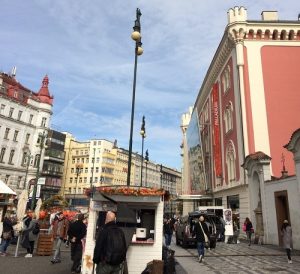Written by Eva Putnam, (Smith College) Student Correspondent CET Prague, Fall 2018
When I applied to study abroad, the option to do an internship was what made me choose CET over other programs. I was elated when I got the email confirming an offer from the British Chamber of Commerce. When it came time to actually go and do it, the thought of the internship honestly made me more nervous than any other aspect of the great unknown I was about to embark on.

For one thing, I was apprehensive about the time commitment. Ten to twenty hours a week sounded like a lot. It is a lot. I do fifteen, which means that in a typical week I spend more time at the British Chamber of Commerce than I do in class, and it is both manageable and absolutely worth it. Interning in two six-hour blocks and one three-hour one (tip: try to arrange your course schedule so that you can work longer, fewer days – you’ll get to do more interesting projects) makes for a packed schedule on weekdays, but I’m still free on evenings, Fridays and weekends – and the location is great: when I’m done for the day, I’m conveniently right down the street from the labyrinthine Palladium mall, more stores and restaurants than I can count, and the seasonal market at Naměsti Republiky, and around the corner from Manifesto Market. Errands? Done immediately and conveniently. Dinner? Right there, delicious, and cheap (seriously, don’t miss Manifesto Market).
Another concern was the language barrier. I knew that all of the internship supervisors speak enough English to choose to have English-speaking interns, and furthermore, that my placement would probably have more English speakers than the others due to the nature of the organization (its purpose is to promote business between the Czech Republic and the UK), so I wouldn’t be totally lost. However, I was worried that I’d feel isolated. During the video interview, my soon-to-be supervisor had explained that while everyone there could speak English and I shouldn’t hesitate to ask what was happening if I was confused, they generally speak to one another in Czech (as one might expect in the Czech Republic). I wouldn’t be able to read the room or jump into a conversation easily. Would I just sit there, doing my work alone, oblivious?
It turns out the answer is no. For one thing, trying to understand things can be a fun and rewarding game. One morning I sat in Czech class, tired, confused, and convinced that I was retaining nothing, and then later that day I went into the office and heard “Kdy se sejdeme? (When are we meeting?)”. We’d just learned that phrase! Now that I’ve learned numbers, times, and days of the week, I might not know what’s happening, but I know when it’s happening. Furthermore, hearing daily conversations between my coworkers has taught me subtleties that aren’t in the textbook – common abbreviations, how to naturally end a phone conversation, which mild profanities are acceptable in an office.

And often, I do get to join the conversation. My coworkers will switch to English to include me, out of kindness and curiosity. I’d been dwelling so much on my lack of cultural competency here that I’d forgotten that there are things I have an inside view on – they are as interested in hearing my perspective as I am in hearing theirs. At lunch or during slow times, they’ll ask my opinion on American politics or Czech food. They’ll discuss current events like the upcoming municipal election. Did you know about the Pirate Party candidate for mayor of Prague? I wouldn’t if I hadn’t signed on to research market trends and draft trade show invitations. The experience of temporarily leaving the “study abroad bubble” – of being the only American in the room, and having conversations with people who are neither professors nor program staff – has been incredible so far, and I can’t wait to see how the rest of the semester goes.